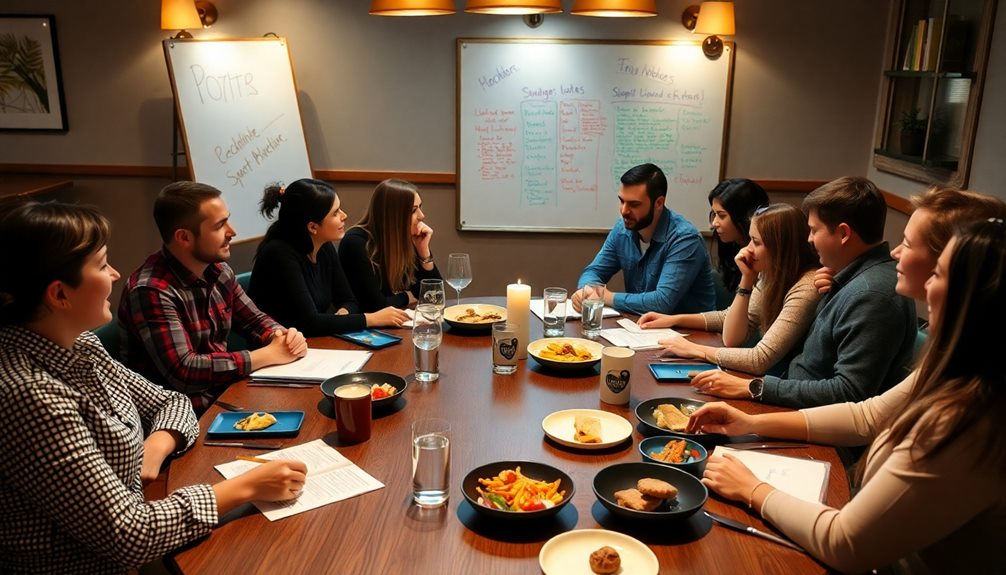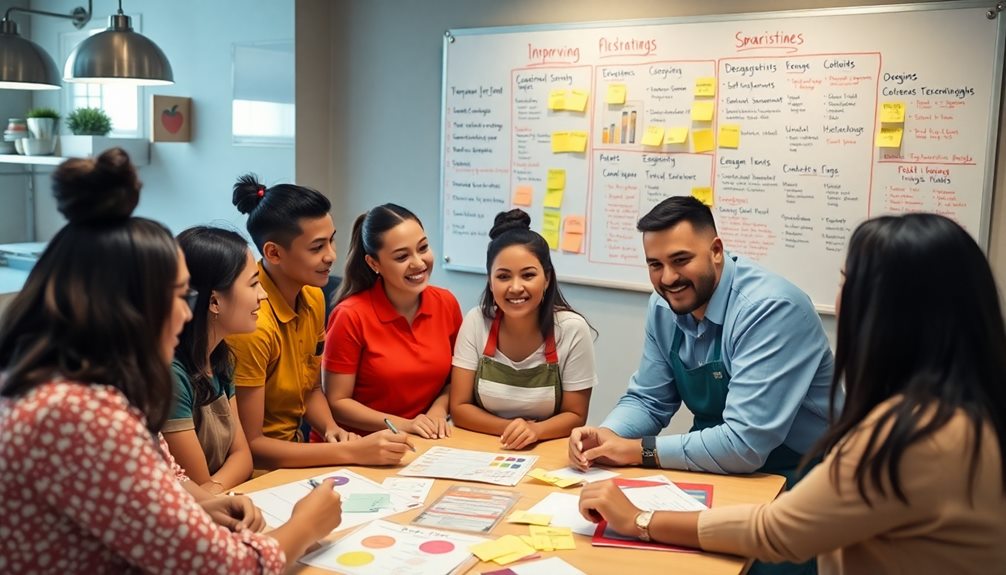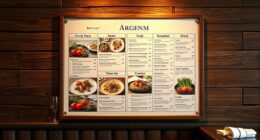To conduct effective restaurant staff meetings, start by setting clear objectives and distributing agendas in advance. Use a consistent schedule and location to promote routine. Engage your team by encouraging open communication and recognizing individual contributions, which boosts morale. Incorporate interactive elements like brainstorming sessions to foster participation. After each meeting, promptly share minutes to clarify action items and responsibilities. Regularly ask for feedback on meeting effectiveness to improve future sessions. This approach helps align your team and enhances accountability, creating a positive atmosphere that drives success—stick around to discover more strategies to elevate your meetings!
Key Takeaways
- Schedule regular staff meetings with clear agendas distributed 24 hours in advance to ensure focused discussions.
- Foster open communication by allocating time for feedback and encouraging idea sharing among team members.
- Recognize team contributions through shout-out segments and visual displays of achievements to boost morale.
- Follow up by distributing meeting minutes promptly and tracking progress on action items to ensure accountability.
- Continuously solicit feedback on meeting effectiveness and adjust objectives quarterly to improve engagement and relevance.
Importance of Staff Meetings

Staff meetings are a crucial part of any successful restaurant operation. They keep you and your team members aligned on operational goals, ensuring everyone's informed and prepared for daily tasks. By holding regular staff meetings, you foster a culture of open communication, allowing team members to voice concerns, share ideas, and contribute to a collaborative work environment.
These meetings aren't just about disseminating important information; they're also opportunities to enhance employee engagement and morale. Recognizing achievements and sharing positive feedback during meetings makes everyone feel valued and motivated.
Additionally, discussing menu updates, service expectations, and customer feedback helps improve overall guest satisfaction and operational efficiency.
Well-structured staff meetings lead to better accountability, allowing you to track action items and measure progress on goals discussed previously. When everyone's on the same page, it creates a cohesive team working towards a common goal.
Ultimately, the significance of staff meetings can't be overstated—they're essential for the smooth operation of your restaurant and the success of your team. By prioritizing these gatherings, you'll create an environment where everyone feels informed, engaged, and ready to contribute to the restaurant's success.
Types of Staff Meetings

When it comes to staff meetings, understanding the different types can make a big difference in your restaurant's operations.
All-hands meetings keep everyone aligned on key issues, while pre-shift meetings help you set the stage for a successful day.
Manager meetings also play an essential role, allowing for strategy discussions that adapt to your team's needs.
All-Hands Meetings Overview
All-hands meetings serve as an essential touchpoint for your entire team, focusing on universal topics like safety and company updates. These meetings, though infrequent, align your staff members on broader business goals and celebrate successes. To guarantee effective meetings, keep them under 60 minutes to prevent information overload.
Here's a quick overview of how to structure your all-hands meetings:
| Element | Purpose | Tips |
|---|---|---|
| Meeting Agenda | Keeps discussions focused on key topics | Distribute in advance to prepare staff |
| Universal Topics | Engages everyone with common interests | Include safety and company updates |
| Interactive Elements | Enhances participation and community feel | Use Q&A sessions or polls |
| Success Celebrations | Boosts morale and motivation | Highlight team and individual achievements |
| Follow-Up Actions | Guarantees accountability and continued dialogue | Summarize key takeaways and next steps |
Pre-Shift Meeting Importance
Pre-shift meetings play an essential role in setting the tone for the day in a restaurant environment.
They're crucial for enhancing team motivation and ensuring that everyone's aligned on daily operations, which directly impacts guest satisfaction. By investing just 15 minutes, you can keep your staff informed about important matters that contribute to a successful service.
Here are some key benefits of pre-shift meetings:
- Inform: Provide updates on menu items, special events, and anticipated customer volume.
- Instruct: Review any specific tasks or changes in procedures for the day.
- Inspire: Recognize staff achievements and encourage team bonding.
- Consistency: Holding these meetings at the same time and location fosters accountability and strengthens team cohesion.
Using the "Three Is" framework—Inform, Instruct, Inspire—ensures structured and effective communication.
Make these meetings a part of your daily routine, and you'll notice a significant improvement in team dynamics and overall service quality.
Manager Meetings Frequency
There's no one-size-fits-all approach to how often managers should meet, as the frequency largely depends on your restaurant's size and operational needs. Typically, you might hold manager meetings weekly or monthly to guarantee everyone stays aligned with the restaurant's goals. Regular meetings keep your staff informed and engaged, which is important for successful restaurant management.
In addition to regular manager meetings, consider the purpose of each gathering. Pre-shift meetings occur daily to address immediate service needs and daily specials, keeping the staff focused and prepared.
All-hands meetings should be infrequent and centered on universal topics, like safety updates or major changes. Front of house meetings can happen a few times a year to discuss service challenges and celebrate successes, while back of house meetings occur at the chef's discretion for menu updates or staff training.
This variety guarantees that all staff members get the attention they need while promoting effective communication. Ultimately, consistency in the meeting structure and timing enhances accountability among managers, fostering a culture of collaboration and support that's vital for your restaurant's success.
Effective Meeting Preparation

Effective meeting preparation is essential for guaranteeing that your restaurant staff meetings are productive and focused. By taking the time to prepare, you can help your team track the progress and stay aligned with the management team's goals.
Here are some key steps to contemplate:
- Distribute meeting agendas at least 24 hours in advance to give staff time to prepare and focus on key topics. This approach mirrors best practices in business startup essentials to foster a structured environment.
- Gather necessary data and reports, such as sales figures and customer feedback, before the meeting to support informed discussions.
- Choose a consistent meeting time and location to enhance attendance and create a habitual routine for staff.
- Confirm all technology, such as projectors or sound systems, is functional before the meeting to prevent disruptions and maintain efficiency.
Engaging Your Team

To truly engage your team, you need to foster open communication and encourage idea sharing.
Utilizing effective digital marketing strategies can also help in promoting a positive team culture and collaboration.
Recognizing team contributions can really boost morale and make everyone feel valued.
When team members feel heard and appreciated, they're more likely to participate actively in discussions.
Foster Open Communication
Establishing open communication within your restaurant team is essential for fostering a collaborative environment. When everyone feels comfortable sharing their thoughts, it enhances teamwork and helps everyone understand everything more clearly.
Here are some strategies to encourage open communication during your meetings:
- Allocate specific time for open discussions, giving everyone a chance to speak and share feedback.
- Utilize active listening techniques, summarizing and validating contributions to show respect and encourage further participation.
- Create a safe space where team members can share concerns, ensuring they know their opinions are valued, and constructive criticism is welcomed.
- Incorporate interactive elements like Q&A sessions or brainstorming activities to promote a culture of dialogue.
Encourage Idea Sharing
Encouraging idea sharing among your restaurant staff can spark creativity and drive innovation. To foster an open dialogue, allocate dedicated time during meetings for your team to voice their concerns and suggestions. This guarantees everyone feels heard and valued.
Incorporate interactive elements like brainstorming sessions or Q&A segments to promote participation; these can lead to some fantastic ideas.
Implement a feedback system where staff can submit ideas anonymously before meetings. This approach allows those who may be less comfortable speaking up to contribute meaningfully. It's crucial to create an environment where everyone knows their thoughts matter.
During the meetings, use visual aids such as whiteboards or digital tools to capture and display ideas. This not only encourages engagement but also helps team members build upon each other's suggestions, enriching the discussion further.
Lastly, make it a point to recognize and celebrate innovative ideas that get implemented. This reinforces a culture of idea sharing and shows that contributions are genuinely valued.
Recognize Team Contributions
Recognizing team contributions is essential for building a motivated and engaged workforce. As restaurant managers, you know that acknowledging both individual and team achievements during meetings can greatly boost morale and drive employee engagement.
In fact, studies show that effective recognition can increase engagement by up to 60%. To cultivate a culture of appreciation, consider implementing the following strategies:
- Introduce a "shout-out" segment where team members can recognize each other for outstanding work.
- Use visual aids, like charts or boards, to showcase team successes, including sales milestones and positive customer feedback.
- Share personal success stories or challenges overcome by your teams to illustrate the impact of individual contributions.
- Celebrate milestones, such as work anniversaries or exceptional service, to strengthen team bonds.
Follow-Up and Accountability
To guarantee that your staff meetings lead to meaningful outcomes, effective follow-up and accountability are essential. Start by promptly distributing meeting minutes after each gathering. This guarantees everyone clearly understands the decisions made and the responsibilities assigned. Establish a system for tracking progress on these action items to help hold team members accountable for their commitments.
In your subsequent meetings, review the status of assigned tasks. This reinforces accountability and provides a platform for team members to update one another. Utilizing a shared document or project management tool can be a game-changer, keeping everyone informed and engaged.
Here's a quick reference table to illustrate the process:
| Step | Action |
|---|---|
| Distribute Meeting Minutes | Send out minutes within 24 hours |
| Track Progress | Use a project management tool |
| Review Assigned Tasks | Discuss task status in the next meeting |
| Encourage Communication | Ask team members to share challenges |
| Foster Accountability | Celebrate completed tasks and improvements |
Encouraging open communication about challenges fosters a supportive culture that enhances team performance.
Continuous Improvement Strategies

After establishing a solid follow-up and accountability framework, it's time to focus on continuous improvement strategies that can enhance the quality and effectiveness of your restaurant staff meetings.
Here are some practical steps to take into account:
- Regularly solicit feedback from your staff about the effectiveness of meetings. This helps identify areas for improvement and allows you to adjust formats based on their preferences.
- Analyze attendance and engagement metrics to track participation trends. Aim for at least an 80% attendance rate to guarantee team alignment during your daily pre-shift meetings.
- Incorporate success stories from implemented ideas discussed in meetings. Highlighting the positive impact of staff contributions motivates continuous participation and reinforces their value.
- Revisit and revise meeting objectives every quarter. Keeping your goals relevant allows you to adapt to changing operational needs and staff dynamics.
Frequently Asked Questions
How to Run a Restaurant Staff Meeting?
To run a restaurant staff meeting, schedule it at a consistent time, share an agenda in advance, maintain a brisk pace, encourage participation, and summarize decisions and action items for clear accountability.
How to Conduct Staff Meetings Effectively?
To conduct staff meetings effectively, start with a clear agenda, allocate specific time for each topic, encourage participation, document decisions, and recognize accomplishments. This approach keeps meetings focused, engaging, and productive for everyone involved.
What Is a Standard Agenda for a Staff Meeting?
Imagine your team's energy soaring like a rock concert. A standard agenda includes welcomes, company updates, performance metrics, key discussions, and concludes with open dialogue, ensuring everyone feels valued and engaged in the meeting.
How a Staff Meeting Is Conducted?
You start the meeting by sharing the agenda, encouraging input from everyone. You keep discussions focused on key topics, assign tasks, and summarize decisions at the end, ensuring clarity and accountability for future actions.
Conclusion
In the end, conducting effective staff meetings is like tending a garden; you need to nurture and cultivate your team for growth. Just as a gardener checks for weeds and provides water, you should engage your staff and address any concerns. Remember, a flourishing restaurant thrives on communication and collaboration. When you invest time in meetings, you're not just planting seeds for today but ensuring a bountiful harvest for the future. Keep growing together!









